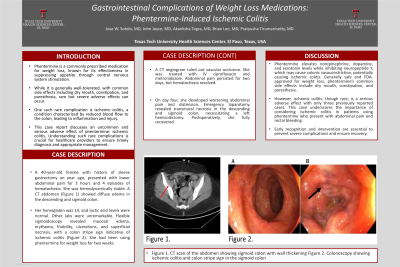Monday Poster Session
Category: Colon
P2030 - Gastrointestinal Complications of Weight Loss Medications: Phentermine-Induced Ischemic Colitis
Monday, October 28, 2024
10:30 AM - 4:00 PM ET
Location: Exhibit Hall E

Has Audio

Jose W. Sotelo, MD
Texas Tech University Health Sciences Center
El Paso, TX
Presenting Author(s)
Jose W. Sotelo, MD1, John Joyce, MD2, Akanksha Togra, MD1, Brian Lee, DO3, Pratyusha TIrumanisetty, MD4
1Texas Tech University Health Sciences Center, El Paso, TX; 2SUNY Upstate Medical University, Syracuse, NY; 3Paul L. Foster School of Medicine, Texas Tech University Health Sciences Center, San Antonio, TX; 4Memorial Medical Center, El Paso, TX
Introduction: Phentermine is a commonly prescribed medication for weight loss, known for its effectiveness in suppressing appetite through central nervous system stimulation. While it is generally well-tolerated, with common side effects including dry mouth, constipation, and paresthesia, rare but severe adverse effects can occur. One such rare complication is ischemic colitis, a condition characterized by reduced blood flow to the colon, leading to inflammation and injury. This case report discusses an uncommon and serious adverse effect of phentermine: ischemic colitis. Understanding such rare complications is crucial for healthcare providers to ensure timely diagnosis and appropriate management.
Case Description/Methods: A 40-year-old female, post-gastric sleeve surgery a year ago, presented with a three-hour history of cramping lower abdominal pain and rectal bleeding. She was hemodynamically stable with four episodes of hematochezia. A CT scan (Figure 1) showed diffuse edema in the descending and sigmoid colon.
Her hemoglobin was 14, and lactic acid levels were normal. Other labs were unremarkable. Flexible sigmoidoscopy revealed mucosal edema, erythema, friability, ulcerations, and superficial necrosis, with a colon stripe sign indicative of ischemic colitis (Figure 2). She had been using phentermine for weight loss for two weeks.
A CT angiogram ruled out vascular occlusion. She was treated with IV ciprofloxacin and metronidazole. Abdominal pain persisted for two days, but hematochezia resolved. On day four, she developed worsening abdominal pain and distension. Emergency laparotomy revealed transmural necrosis in the descending and sigmoid colon, necessitating a left hemicolectomy. Postoperatively, she fully recovered.
Discussion: Phentermine elevates norepinephrine, dopamine, and serotonin levels while inhibiting neuropeptide Y, which may affect colon blood vessels, potentially causing ischemic colitis. Generally safe and FDA-approved for weight loss, phentermine’s common side effects include dry mouth, constipation, and paresthesia. However, ischemic colitis, though rare, is a serious adverse effect with only three previously reported cases. This case underscores the importance of considering ischemic colitis in patients using phentermine who present with abdominal pain and rectal bleeding. Early recognition and intervention are essential to prevent severe complications and ensure recovery.

Disclosures:
Jose W. Sotelo, MD1, John Joyce, MD2, Akanksha Togra, MD1, Brian Lee, DO3, Pratyusha TIrumanisetty, MD4. P2030 - Gastrointestinal Complications of Weight Loss Medications: Phentermine-Induced Ischemic Colitis, ACG 2024 Annual Scientific Meeting Abstracts. Philadelphia, PA: American College of Gastroenterology.
1Texas Tech University Health Sciences Center, El Paso, TX; 2SUNY Upstate Medical University, Syracuse, NY; 3Paul L. Foster School of Medicine, Texas Tech University Health Sciences Center, San Antonio, TX; 4Memorial Medical Center, El Paso, TX
Introduction: Phentermine is a commonly prescribed medication for weight loss, known for its effectiveness in suppressing appetite through central nervous system stimulation. While it is generally well-tolerated, with common side effects including dry mouth, constipation, and paresthesia, rare but severe adverse effects can occur. One such rare complication is ischemic colitis, a condition characterized by reduced blood flow to the colon, leading to inflammation and injury. This case report discusses an uncommon and serious adverse effect of phentermine: ischemic colitis. Understanding such rare complications is crucial for healthcare providers to ensure timely diagnosis and appropriate management.
Case Description/Methods: A 40-year-old female, post-gastric sleeve surgery a year ago, presented with a three-hour history of cramping lower abdominal pain and rectal bleeding. She was hemodynamically stable with four episodes of hematochezia. A CT scan (Figure 1) showed diffuse edema in the descending and sigmoid colon.
Her hemoglobin was 14, and lactic acid levels were normal. Other labs were unremarkable. Flexible sigmoidoscopy revealed mucosal edema, erythema, friability, ulcerations, and superficial necrosis, with a colon stripe sign indicative of ischemic colitis (Figure 2). She had been using phentermine for weight loss for two weeks.
A CT angiogram ruled out vascular occlusion. She was treated with IV ciprofloxacin and metronidazole. Abdominal pain persisted for two days, but hematochezia resolved. On day four, she developed worsening abdominal pain and distension. Emergency laparotomy revealed transmural necrosis in the descending and sigmoid colon, necessitating a left hemicolectomy. Postoperatively, she fully recovered.
Discussion: Phentermine elevates norepinephrine, dopamine, and serotonin levels while inhibiting neuropeptide Y, which may affect colon blood vessels, potentially causing ischemic colitis. Generally safe and FDA-approved for weight loss, phentermine’s common side effects include dry mouth, constipation, and paresthesia. However, ischemic colitis, though rare, is a serious adverse effect with only three previously reported cases. This case underscores the importance of considering ischemic colitis in patients using phentermine who present with abdominal pain and rectal bleeding. Early recognition and intervention are essential to prevent severe complications and ensure recovery.

Figure: Figure 1. CT scan of the abdomen showing sigmoid colon with wall thickening
Figure 2. Colonoscopy showing ischemic colitis and colon stripe sign in the sigmoid colon
Figure 2. Colonoscopy showing ischemic colitis and colon stripe sign in the sigmoid colon
Disclosures:
Jose Sotelo indicated no relevant financial relationships.
John Joyce indicated no relevant financial relationships.
Akanksha Togra: Clinexel Inc – Owner/Ownership Interest. Clinexel Life Sciences Pvt Ltd – Owner/Ownership Interest. Cytenet Life science LLP – Owner/Ownership Interest. GLRK Healthcare foundation (Non-profit Organization Company) – Owner/Ownership Interest.
Brian Lee indicated no relevant financial relationships.
Pratyusha TIrumanisetty indicated no relevant financial relationships.
Jose W. Sotelo, MD1, John Joyce, MD2, Akanksha Togra, MD1, Brian Lee, DO3, Pratyusha TIrumanisetty, MD4. P2030 - Gastrointestinal Complications of Weight Loss Medications: Phentermine-Induced Ischemic Colitis, ACG 2024 Annual Scientific Meeting Abstracts. Philadelphia, PA: American College of Gastroenterology.
